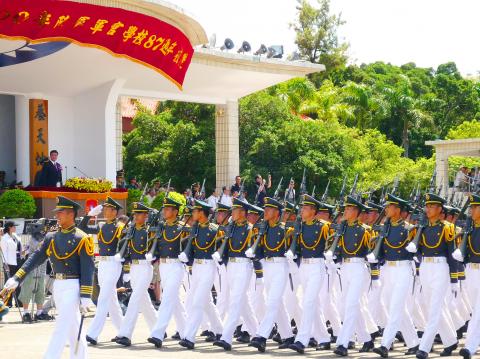Minister of National Defense Kao Hua-chu (高華柱) departed from his script yesterday during the 87th Anniversary of the Republic of China (ROC) Military Academy yesterday and emphasized that the ROC military and the People’s Liberation Army (PLA) were two entirely distinct entities.
“The nation's army is the ROC Army, and the PLA is the PLA, a fact that serving or retired officers should all know,” Kao said.
The minister’s comments came in the wake of a recent controversy over comments allegedly made by retired Air Force general Hsia Ying-chou (夏瀛洲) on a visit to China.

Photo: CNA
According to reports in the local Chinese-language media, Hsia allegedly told a gathering of retired military officers that no distinction should be made between the ROC army and the PLA, as both were “China’s army.”
Hsia has denied ever making such a comment.
Kao commended the long-term contributions of the Military Academy and encouraged students to learn from their predecessors’ spirit of sacrifice and determination to fight, glorifying the spirit of Huangpu, as the Military Academy was known when it was founded in Guangdong Province, China, in May 1924.
Turning to wu de, or martial virtue, Kao said the armed forces must pursue the ideals of defending the country and people, and maintaining social stability, adding that martial virtue was in essence a soldier’s “second life.”
“If the military cannot subscribe to those ideals or even turn its back on them, it not only turns its back on the nation that trained them, but also on the people who put their trust in them, and this will have a deeply negative impact on national security,” Kao said.
Following news of Hsia’s alleged comments, President Ma Ying-jeou (馬英九) ordered a thorough review of regulations over visits to China by retired military officers.
At a routine press conference by China’s Taiwan Affairs Office (TAO) on Wednesday, Taiwanese media asked whether the Chinese felt the continuation of the controversy over Hsia’s statement could affect military exchanges and mutual trust across the Taiwan Strait.
TAO spokesperson Yang Yi (楊毅) said the “deep exchanges” had increased mutual understanding and promoted peaceful development, which was an important development in relations between the two sides.
However, Yang also said limiting cross-strait exchanges or “actively fanning antagonistic ideologies” — a veiled reference to pro-independence forces in Taiwan — would be detrimental to the “hopes of the people across the Strait” and against the tide of cross-strait development.
It would also be unwise, Yang said.
Commenting on Yang’s remarks, Democratic Progressive Party (DPP) Legislator Tsai Huang-liang (蔡煌瑯) accused the TAO of “blatantly carrying out ‘united front’ rhetoric,” adding that the remarks were tantamount to slapping Ma in the face.
DPP Legislator Wong Chin-chu (翁金珠) said the TAO’s strong language and assumed suzerainty over Taiwan was completely unacceptable to the DPP and Taiwanese.
Wong said retired generals who used inappropriate language that betrayed the nation and undermined trust in the government would rightly be criticized.
“We have our own stance and the TAO has no right and is in no position to criticize us,” Wong said.
TRANSLATED BY JAKE CHUNG, STAFF WRITER

Several Chinese Nationalist Party (KMT) officials including Chairman Eric Chu (朱立倫) are to be summoned for questioning and then transferred to prosecutors for holding an illegal assembly in Taipei last night, the Taipei Police said today. Chu and two others hosted an illegal assembly and are to be requested to explain their actions, the Taipei City Police Department's Zhongzheng (中正) First Precinct said, referring to a protest held after Huang Lu Chin-ju (黃呂錦茹), KMT Taipei's chapter director, and several other KMT staffers were questioned for alleged signature forgery in recall petitions against Democratic Progressive Party (DPP) legislators. Taipei prosecutors had filed

Taiwan would welcome the return of Honduras as a diplomatic ally if its next president decides to make such a move, Minister of Foreign Affairs Lin Chia-lung (林佳龍) said yesterday. “Of course, we would welcome Honduras if they want to restore diplomatic ties with Taiwan after their elections,” Lin said at a meeting of the legislature’s Foreign Affairs and National Defense Committee, when asked to comment on statements made by two of the three Honduran presidential candidates during the presidential campaign in the Central American country. Taiwan is paying close attention to the region as a whole in the wake of a

NEW WORLD: Taiwan is pursuing innovative approaches to international relations through economics, trade and values-based diplomacy, the foreign minister said Taiwan would implement a “three-chain strategy” that promotes democratic values in response to US tariffs, Minister of Foreign Affairs Lin Chia-lung (林佳龍) said. Taiwan would aim to create a “global democratic value chain,” seek to capitalize on its position within the first island chain and promote a “non-red supply chain,” Lin was quoted as saying in the ministry’s written report to the Legislative Yuan submitted ahead of the legislature’s Foreign Affairs and National Defense Committee meeting slated for today. The Ministry would also uphold a spirit of mutual beneficial collaboration, maintaining close communication and consultations with Washington to show that Taiwan-US cooperation

Taiwan and the US have begun trade negotiations over tariffs imposed by US President Donald Trump earlier this month, Minister of Foreign Affairs Lin Chia-lung (林佳龍) said in an interview this morning before reporting to the Legislative Yuan’s Foreign Affairs and National Defense Committee. The Taipei Economic and Cultural Representative Office (TECRO), Taiwan’s de facto embassy in the US, has already established communication channels with the US Department of State and the US Trade Representative (USTR), and is engaging in intensive consultations, he said. Points of negotiation include tariffs, non-tariff trade barriers and issues related to investment, procurement and export controls, he